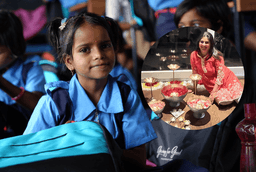

- 08 Mar 2024

In the heart of Indian history exists a luminous figure, Savitribai Phule, hailed as the mother of feminism and the first female teacher of India. We owe her the freedom of equal education rights that we enjoy today. However, despite her social reforms, she didn’t live as a hero in her time. In fact, she was asked to leave her own house for wanting to learn. Born in 1831 in Naigaon, a small village in Maharashtra, Savitribai grew up like any other girl. She was deprived of education and was never given an opportunity to learn to read or write. However, inherent curiosity and a thirst for knowledge refused to be suppressed.
Like most girls at that time, Savitribai was married at the age of 9. She was married to a 12-year-old Jyotirao Phule and was expected to lead the life of an ‘obedient wife’ for the rest of her life. But in her case, her husband, who was a young boy himself, would turn out to be a young man with progressive ideals. One of Savitribai’s most treasured possessions was a book gifted to her by a Christian missionary. Savitribai Phule's journey towards literacy began with a simple question from a child's perspective: why were girls excluded from education? Jyotirao, recognizing Savitribai's potential, became her teacher, opening the doors to a world of knowledge that had been previously unattainable. Savitribai, a quick learner, excelled in her studies and became the first educated woman in modern India. She went on to get trained as a teacher at Ms. Farar’s institution in Ahmednagar. Jyotirao stood by her through it all, and this ignited a shared passion in the couple to fight for the education of girls and women, a cause they believed was fundamental to social progress.
In 1848, they embarked on a revolutionary journey by opening Bhide Wada, the first school for girls in Pune, India. This act of defiance challenged the deeply rooted patriarchal norms of the time. A girl going to school and getting an education that is exclusive to high-class males? The societal backlash was massive, and the couple was asked to leave their home. But their commitment was unwavering! Savitribai, a qualified teacher by then, would leave her home for school with an extra saree every day. But why did she need an extra saree? Due to the relentless pelting of waste, mud, and sometimes even dung by the people in the neighborhood. Her fault was that she was a woman trying to teach young girls how to read, write, and educate themselves. But these stones couldn’t break her iron will, and she would change into a fresh saree and start teaching.
The couple started with five girls in 1948 and managed to enroll around 150 girls in three different schools in Pune by 1951! One of their schools was started at a Muslim family’s home, where they went on to empower the first ever Muslim female teacher in India, Fatima Sheikh. By giving out stipends to ensure lower dropout rates and conducting parent-teacher meetings regularly to create awareness among parents, Savitribai proved her modern ideals and stood as a symbol of hope and empowerment for countless girls who dreamt of education. She later went on to open 18 schools over time, teach children from all socioeconomic backgrounds, and become a poet herself.
Savitribai's compassion extended beyond the realm of education. She tirelessly campaigned against social evils like child marriage, sati pratha, and the caste system. Deeply affected by the plight of widows and oppressed communities, she established a shelter for them in 1854. This shelter provided not just refuge but also education, empowering them to reclaim their lives with dignity.
Her fight for social justice extended to the oppressed classes, who were denied access to basic amenities like drinking water due to the caste system. Jyotirao and Savitribai challenged this blatant discrimination by digging a well in their own backyard for the marginalized communities. Savitribai was instrumental in shaping the Satyashodhak Samaj, a society founded by Jyotirao to advocate the elimination of social discrimination. In 1873, she initiated the practice of Satyashodhak marriage, a ceremony that emphasized education and equality as the cornerstones of a marriage.
After dedicating his entire life to empowering social reforms, Jyotirao passed away in 1890. Defying social norms once again, Savitribai lit her husband’s funeral pyre. She took charge of the Satyashodhak Samaj, ensuring that Jyotirao's legacy of social reform lived on, and served as a prominent leader for seven years. Tragically, in 1897, while tending to victims of the bubonic plague, Savitribai contracted the disease herself and succumbed to it on March 10th. Savitribai and Jyotirao Phule both lived for the betterment of people till their last breath, and their contribution to India lives on to this day. As we celebrate International Women's Day in 2024, Savitribai’s life and work remind us of the transformative power of education and the unwavering spirit of a woman who dared to challenge age-old societal norms. Her legacy continues to inspire countless people who work towards gender equality and social justice in India and beyond. We hope that on this International Women’s Day, you take the time to empower one girl with education that she deserves!
Team Giving for Good Foundation wishes you and your loved ones a Happy Women’s Day!
Exclusively written for Giving for Good Foundation by Bhairavi Hiremath

With words as her medium and a diary full of scribbled ideas, she is usually found looking for ways to use her writing to impact for Good. If she’s out of sight, she’s probably either reading, petting cats, jamming to retro Bollywood, or of course, writing!